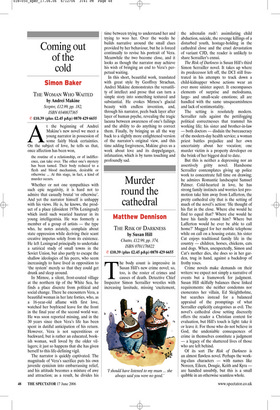Coming out of the cold
Simon Baker
THE WOMAN WHO WAITED by Andreï Makine Sceptre, £12.99, pp. 182, ISBN 0340837365 ✆ £10.39 (plus £2.45 p&p) 0870 429 6655 At the beginning of Andreï Makine’s new novel we meet a young narrator in possession of some fairly bleak certainties. On the subject of love, he tells us that, once affection has been won,
the routine of a relationship, or of indifference, can take over. The other one’s mystery has been tamed. Their body reduced to a flesh and blood mechanism, desirable or otherwise ... At this stage, in fact, a kind of murder occurs.
Whether or not one sympathises with such epic negativity, it is hard not to admire that casually brutal ‘or otherwise’. And yet the narrator himself is unhappy with his views. He is, he knows, the product of a place (dissident 1970s Leningrad) which instil such wearied hauteur in its young intelligentsia. He was formerly a member of a group of artists — the type who, he notes astutely, complain about state oppression while deriving their scant creative impetus solely from its existence. He left Leningrad principally to undertake a satirical study of small towns in the Soviet Union, but also partly to escape the shallow ideologies of his peers, who seem increasingly to have lived in opposition to ‘the system’ merely so that they could get drunk and sleep around.
In Mirnoe, a silent, frost-coated village at the northern tip of the White Sea, he finds a place discrete from political and social change. There he encounters Vera, a beautiful woman in her late forties, who, as a 16-year-old aflame with first love, watched her boyfriend leave for the front in the final year of the second world war. He was soon reported missing, and in the 30 years since then Vera’s life has been spent in dutiful anticipation of his return. However, Vera is not superstitious or backward, but is rather an educated, bookish woman, well loved by the older villagers; it just so happens that she has given herself to this life-defining vigil.
The narrator is quickly captivated. The magnitude of Vera’s sacrifice puts his own juvenile cynicism into embarrassing relief, and his attitude becomes a mixture of awe and attraction; as a result, he divides his time between trying to understand her and trying to woo her. Over the weeks he builds narrative around the small clues provided by her behaviour, but he is forced continually to revise his portrait of Vera. Meanwhile the two become close, and it looks as though the narrator may achieve his wish of bringing an end to Vera’s perpetual waiting.
In this short, beautiful work, translated with great style by Geoffrey Strachan, Andreï Makine demonstrates the versatility of intellect and prose that can turn a simple story into something textured and substantial. He evokes Mirnoe’s glacial beauty with endless invention, and, through his narrator, peels back layer after layer of human psyche, revealing the tragic lacuna between awareness of one’s failings and the ability to do anything to correct them. Finally, by bringing us all the way back to a slightly more enlightened version of the narrator’s original view, and this time adding forgiveness, Makine gives us a work about love and its doppelganger, infatuation, which is by turns touching and profoundly sad.


















































































 Previous page
Previous page